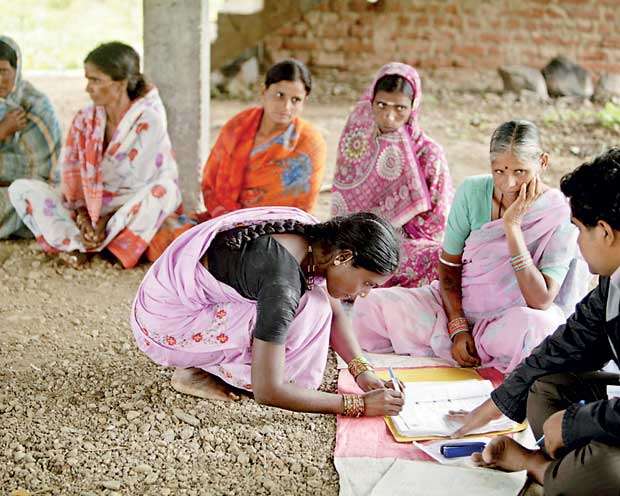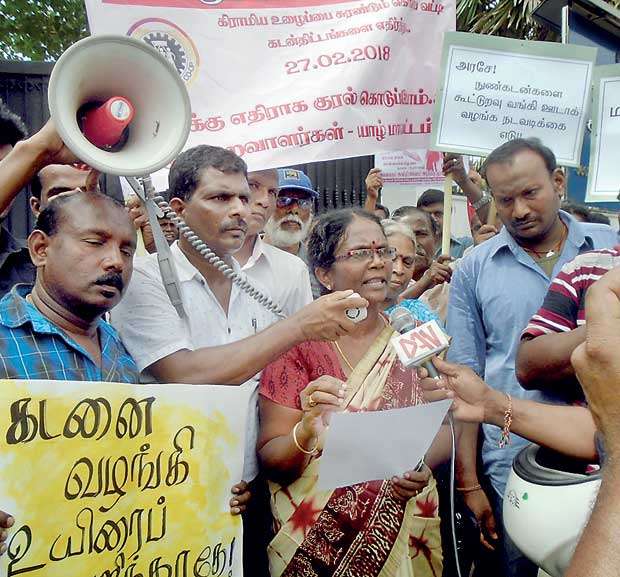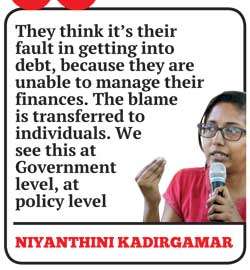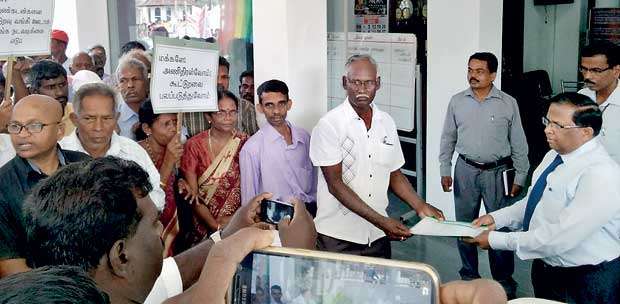Reply To:
Name - Reply Comment
Last Updated : 2024-04-19 07:40:00

 After a nearly three-decade civil war those devastated by it had to rebuild their lives and finding employment was a challenge. The strategy adopted by the Government was to expand credit and promote self-employment. But then things took a turn for the worse when their livelihoods did not flourish. People could not repay the mounting debts. The once war-torn areas of the country are now mired by multiple loans which include ‘predatory’ microfinance loans and loans provided by informal lenders at exorbitant interest rates.Failed attempts at self-employment coupled with accumulating high interest loans have now driven families to the brink of poverty.
After a nearly three-decade civil war those devastated by it had to rebuild their lives and finding employment was a challenge. The strategy adopted by the Government was to expand credit and promote self-employment. But then things took a turn for the worse when their livelihoods did not flourish. People could not repay the mounting debts. The once war-torn areas of the country are now mired by multiple loans which include ‘predatory’ microfinance loans and loans provided by informal lenders at exorbitant interest rates.Failed attempts at self-employment coupled with accumulating high interest loans have now driven families to the brink of poverty.
In October last year a heavily indebted mother committed suicide consuming poison mixed ice-cream which she had given to her three children, who died alongside her. Sources told Daily Mirror that some women migrated to the Middle East as housemaids to repay the loans. Some women, unable to pay loans, have gone into hiding leaving behind children. Profit oriented microfinance companies and informal lenders harass, threaten and pressurize them in an attempt to collect the monies that are due. Their target is most often than not poor rural women. Some microfinance institutions provide loans only to women.
Political Analyst and Economist based in Jaffna, Ahilan Kadirgamar said that the strategy adopted by the Government to promote self-employment after the war by obtaining loans was a flawed strategy. “Those affected by the war for decades had a lot more competition in the market and found it hard to earn a living using loans. When they couldn’t generate an income they started pawning their jewellery,” he said.
At the same time microfinance companies started expanding. Kadirgamar said that the loans provided came with high interest. “People are already indebted by bank loans which were provided at subsidized interest rates like 8%. The banks also provided self-employment loans in the order of 14% and so on. They also have to repay the loans obtained upon pawning which are between 15-21%,” he said.
Effective interest between 40% and 220%
He pointed out that though the interest levied by microfinance companies was between 24% and 28% the effective interest rate when calculated was between 40% and 220%. “These are very predatory loans and people are not aware of it also because their loan sheets say they will be paying an interest of 24%-28%,” he said, adding that people did not understand the loan conditions. He said the  microfinance companies merely asked for the NIC and people did not have to provide security for the loans obtained.
microfinance companies merely asked for the NIC and people did not have to provide security for the loans obtained.
Microfinance loans are required to be paid monthly or weekly or daily depending on the type of agreement. “They have to start paying part of the principal and the interest starting the first week or so. So you haven’t used the money for anything and you’re already starting to pay back the loan. So when you calculate the effective annual interest rate it is so high,” he said. In other words, irrespective of the fact that the repayment has to be made immediately, microfinance companies require a dividend of the principal and the interest for a year to be paid in the weekly or monthly installments etc.
“There is no way the rural women who take these loans are going to make an income. These loans are a form of exploitation. In many rural areas you find women who have taken multiple loans, but no real production nor real self-employment happens through that,” he said.
The loans obtained by different microfinance companies are known by the days of the week, as ‘Monday loan’, ‘Tuesday loan’ etc. They signify the day of week that agents from a particular microfinance company would visit the village to collect payment. Loans are provided by these companies to groups of threes or fives. Speaking to the community workers attached to the Suriya Women’s Development Center referring to the experience of debtors in a village in Batticaloa said that when one person did not pay, others in the group were held responsible. “Even if you’re pregnant or you have small children you’re not allowed to leave the place until the amount owed by the person who hasn’t paid, is settled,” said S.Ariyamalar, a community worker.

Many told us that these microfinance companies use a naming and shaming strategy to compel people to repay the loans.
“They even stay in front of the houses of the women who are in debt, intimidating them, until the money is paid,” Ariyamalar said.
When unable to pay the debt owed to one microfinance company women often borrow money from other microfinance companies and informal money lenders at very high interest rates. “Even these money lenders end up harassing women who are unable to repay. Police complaints are made. The police file a case before court. But court proceedings are very slow and there have been instances where disputes have led to violence,” said A.Elangaeswary, another community worker.
She further said that lorries arrive at this village selling household appliances on an installment basis. Villagers initially pay around Rs. 200 to take possession of the appliance. However, they end up obtaining loans to pay the installments. “When women are unable to repay, the appliance is forcibly taken away and the money that has already been paid is not returned,” she said. She further said that aspirations in the post-war context to rebuild their lives and to climb the social ladder have made villagers purchase such appliances.
Protest in February
In February this year a protest was held in Jaffna with around 3000 participants demanding action against ‘predatory microfinance companies.’ The statement handed over by theJaffna District Cooperative Council to the Jaffna GA and the Governor of the Northern Province attributes the crisis to the lack of opportunities for employment and sustainable livelihoods along with the worrying expansion of financial institutions.
Their demands are as follows:
Deteriorating conditions at home
She further said that some women were in hiding which led to deteriorating conditions at home. “There is no one to look after the children. Children don’t go to school. And there is no food for them,” she said. In the absence of their mothers, children are often questioned about their mother’s whereabouts. This has led to the harassment of children and they are mentally affected as a result, she said. The also learned that some women have had to migrate and work as housemaids to repay loans.
In certain female headed households the pressure to repay loans has caused women to enter into relationships with men, she said.
The two community workers said that what was deeply concerning was that apart from being debt ridden, women lose the few assets they own such as land or jewelry in an attempt to pay off the mounting debts.
“These microfinance companies care only about repayment. They have grand objectives saying that it is for poverty alleviation, livelihood development, improving the economic condition. But all they do is to give the money and make sure it is repaid,” Ariyamalar said.
The Secretary of the Co-operative Council of the Jaffna District, Vethavalli Selvaratnam said that agents from microfinance companies make home visits and easily brainwash women into accepting microfinance loans. “With regard to houses built after the war women have the desire to buy TVs and refrigerators etc,” she said pointing to a dangerous trend. Further, women accept these loans without the knowledge of the husband, she said. “Unemployed women have no income. They are afraid to ask for money from their husbands too because they have not told them. Then they pawn the jewellery they possess,” she said. “There are also households where there are broken marriages because of microfinance loans,” she said.
She further said that the microfinance loan forms were in English and most did not understand the content within. “The forms say that if you don’t pay the first week, you have to pay an additional amount. But these women aren’t aware of this,” she said.
She further said that women who work for daily wages work overtime to repay these loans and cut down on the amount of food and milk given to their children.

Meanwhile, Raga Alphonsus, the Programme Advisor to ZOA-an NGO based in Kilinochchi and Mannar- said that after the war the Government and humanitarian actors offered livelihood packages to families affected by the war in the North and East. However, this package was not timely and inadequate in most instances. In the fishing community, for example, fishermen had to borrow money to purchase the necessary fishing gear.
In the village of Nachchikuda a woman borrowed money from a microfinance company so her 28-year-old husband could go fishing. They had borrowed Rs. 40 000 at an interest of 26% to purchase the necessary fishing nets. They were expected to pay the principal amount and the interest in 48 weekly instalments. However, the 28-year-old husband lost his nets and there was no income generating. His wife borrowed a second loan from another microfinance company, at an interest rate 26%, so as to repay the first loan. As a result they were required to pay two loans a week. Unable to sustain the family the husband has now mortgaged the house, also at a 26% interest. Currently they have to pay three loans a week and they are at the risk of losing their home.
Another woman from the same area has obtained a loan of Rs. 150 000 at the interest rate of 60% in 2015. Her deed of the house has been provided as security. So far she has not been able to repay the money and there is pressure to transfer the house.
Speaking to the a 32-year-old woman from Mannar said that she had obtained a loan from a microfinance company so that her husband could engage in paddy cultivation. “But our cultivation was destroyed by the rain. There is no income and we can’t pay these accumulating loans,” she said. She had taken loans worth Rs. 5000 initially, then another Rs. 200 000 followed by another worth Rs. 300 000.
Another 40-year-old woman, also from Mannar, said that she along with her sister and brother had borrowed Rs. 300 000 from a microfinance company to support a neighbour to set up a shop. “The neighbour was unable to borrow the money himself because he had not repaid another loan obtained to purchase a bicycle,” she said. He had previously requested them to get him a loan of Rs. 50 000 which he had repaid. “So we thought he’ll pay this loan too,” she said. The shop has closed down as no sufficient income was being generated. The neighbour has refused to pay back. “As a result we are  forced into paying the weekly loan. We even had to pawn our jewellery,” she said.
forced into paying the weekly loan. We even had to pawn our jewellery,” she said.
Speaking at a recent workshop on Debt and Micro Credit Niyanthini Kadirgamar of the Collective for Economic Democratization said that Government programs like Samurdhi, which are supposed to help people escape poverty, are in fact subsidizing the loan payments of microfinance companies, who were making huge profits.
She questioned how a poor woman, who has very little assets, is expected to make investments. “How can you expect her to generate an income to fulfill her household expenses and above that to be able to repay these loans?” she quizzed.
Further, she pointed out that people blamed themselves for falling into debt traps. “They think it’s their fault in getting into debt, because they are unable to manage their finances. The blame is transferred to individuals. We see this at Government level, at policy level. But when it comes to discussions at the ground level we don’t talk about the fact that this is also structurally created. It’s also about Government policy,” she said.
“Political representatives in the North have been completely silent about this,” she charged.
Meanwhile, she said that the issue of microfinance affected not only the North and East, but also other parts in the island. She pointed to a lack of research in other parts of the country. She raised concern about factories offering microfinance loans tied to worker’s wages. “In terms of the North and East what’s also important is that unlike in other parts of the country, it seems that it is after 2009 that microfinance companies have mushroomed. It is that quick change within a short period of time and we have seen their impact in a more pronounced way in the North and East,” she said.
She also said that resistance in proportion to the impact has been very less. “Nevertheless, in the North and East, women’s groups spoke to the Government Agents in Batticaloa, Kilinochchi and Jaffna and have asked to control these finance companies and their activities in the villages.
What needs to be done?
Microfinance Act
The Microfinance Act (No. 06 of 2016) provides for the licensing, regulation and supervision of companies carrying on microfinance business. Ahilan Kadirgamar said that though this Act gives the Central Bank the power to deploy an interest rate cap, the Central Bank has not implemented it.
“If they were to implement it that would set a standard,” he said.
 He further pointed out that not all microfinance companies fall under the Microfinance Act as those which are only lending organizations are excluded. “This needs to be changed,” he stressed.
He further pointed out that not all microfinance companies fall under the Microfinance Act as those which are only lending organizations are excluded. “This needs to be changed,” he stressed.
Meanwhile, he said, the Central Bank has introduced a Customer Charter which talks about the rights of the customers in relation to microfinance companies. “But in practice all these are infringed,” he said.
Kadirgamar said that Government Agents can be empowered to bring in rules which bar the agents of microfinance companies from entering certain towns. He further stressed that there should be more political will to address the situation.
According to him, debts should either be forgiven or there should be a moratorium at a much lower interest rate, as in most cases, women find it impossible to pay back.
The Budget for 2018 identifies indebtedness in the rural sector, targeted by exploitative microfinance schemes, as a serious issue. Accordingly Rs. 1000 million has been allocated to provide grants and introduce a low interest loan scheme to facilitate those indebted and to move out the debt trap through Co-operative Rural Banks and the Thrift and Credit Co-operative. It is to be implemented on a pilot basis in the North and the North Central Provinces.
“You have to provide alternate credit. That is where these Budget proposals come into play. When people are in dire need they can obtain these loans instead of going to money lenders in the village,” he said.
“No directions issued regarding interest rate cap”-CBSL
W. Ranaweera, the Director of the Department of Supervision of Non-Bank Financial Institutions of the Central Bank of Sri Lanka(CBSL) said that the CBSL would regulate microfinance companies according to the Microfinance Act. Accordingly, certain directions have been issued and microfinance companies which fall under the purview of the CBSL are required to comply.
However, he said that no directions have been issued regarding an interest rate cap. “At the moment we have received only a limited number of applications, and even those are not qualified to be registered,” he said.
We have to first decide on how many companies should be regulated. Once the initial stage is complete we can address other issues.
“We have to first decide on how many companies should be regulated. Once the initial stage is complete we can address other issues. Under the Act the regulator can issue directions. There may be a possibility of issuing directions with regard to interest rates etc. We can consider all this after analysing the total picture of the industry. We will have to visit the companies and obtain information,”
he said. He said that companies which are merely lending institutions did not fall under its purview. “But if they accept deposits they can’t operate without registering with us,” he said.
Money Lending Ordinance
According to the Money Lending Ordinance with regard to informal loans above Rs. 2500 an interest rate above 15% per annum cannot be imposed. Alphonsus highlighted that money lenders violated such provisions, driving people into poverty and debt traps. Further, the Money Lending Ordinance also states that an interest which exceeds the principal amount is not recoverable. Hence on the part of the debtors there is no legal obligation to repay such debts. However, Alphonsus pointed out that debtors were often disempowered while creditors were very powerful. “So they will not refuse payment,” he said.

Alphonsus said that money lenders often waited for the debt to be accumulated so that they can take ownership of the property.
Debt Counselling
He further pointed out that in the event a business failed, despite the educated having the power to negotiate with banks with the help of financial experts and lawyers, such an option was not, in practical circumstances, available to villagers. He suggested that there should be debt counselling or a service whereby debtors can come to an amicable settlement with the creditors. “This is the only way to demand some kind of accountability from the loan sharks,” he said.
“This is a total trap. These people are war victims. There’s a lot of stress at home and children are at the butt-end of it all. Women are pressurised to feed their children and men go and drink alcohol, which makes the situation worse,” said Alphonsus.
Why not banks?
As a result of debts already owed to banks and stringent requirements at banks to obtain loans people prefer obtaining loans from microfinance companies where the requirements are flexible. Alphonsus said that most, especially in the fisheries sector, were blacklisted due to non-payment of loans obtained soon after resettlement without adequate due diligence and therefore could not apply for loans from banks. Further, the requirements to be fulfilled, including guarantors with a stable income to obtain a loan from a bank, also make people reluctant to approach the banks. “You also need to build a good track record in the bank to obtain a loan. A lot of paper work is required. You also need to travel a long distance several times to access banks whereas agents from these finance companies come to your house,” he said.
Meanwhile, he made a distinction between social service oriented microcredit institutions and money minded micro-credit institutions. He pointed out that the social service oriented micro-credit institutions provide money for the well-being of the population. “They charge a low interest so that they are able to maintain their staff. But profit oriented microfinance companies are ruthless when it comes to repayment,” he said.
Apply Now Wednesday, 08 August 2018 04:58 PM
Actually I also got a loan of $ 50,000.USD. from Monevo Loan to start up my business. email (monevoloanfunds@outlook.com) I recommended to you that if you don't have enough money to start up your business then go for it interest rate is very low.

Add comment
Comments will be edited (grammar, spelling and slang) and authorized at the discretion of Daily Mirror online. The website also has the right not to publish selected comments.
Reply To:
Name - Reply Comment
On March 26, a couple arriving from Thailand was arrested with 88 live animal
According to villagers from Naula-Moragolla out of 105 families 80 can afford
Is the situation in Sri Lanka so grim that locals harbour hope that they coul
A recent post on social media revealed that three purple-faced langurs near t